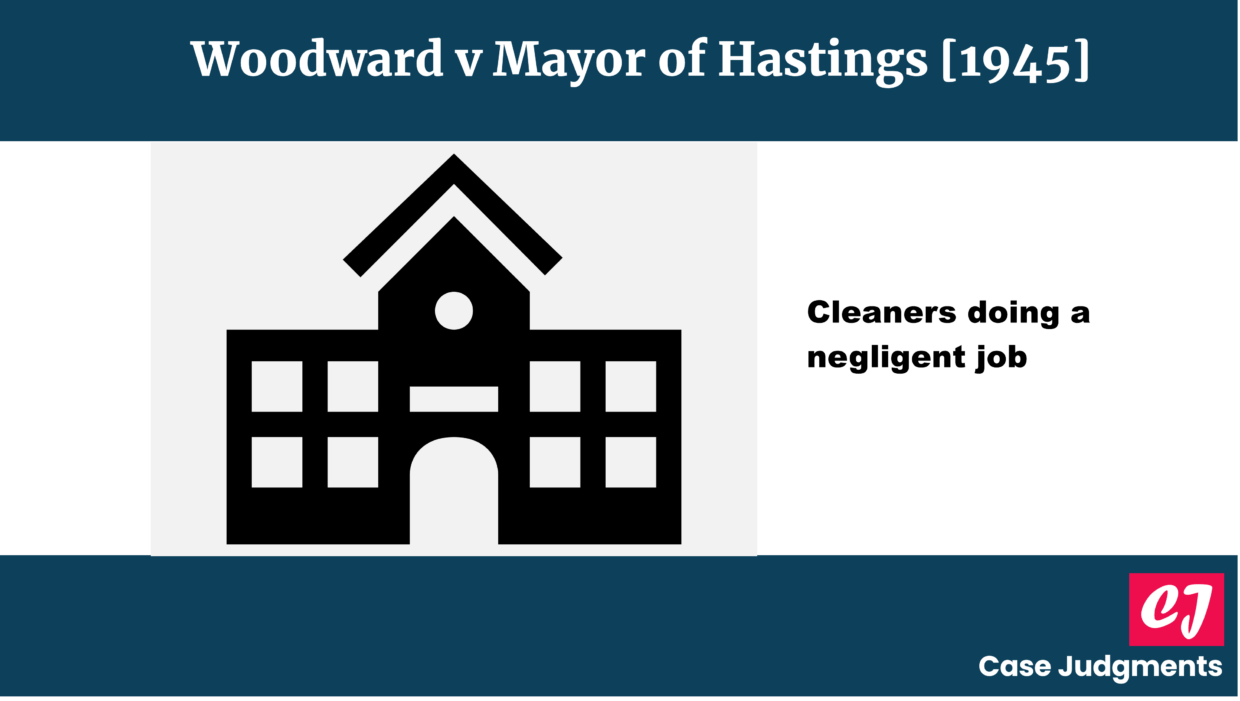
Woodward v Mayor of Hastings [1945]: A Summary
Woodward v Mayor of Hastings [1945] is a tort law case concerning the liability of a school to ensure that its premises are safe for the children. Especially, where the safety of the work done by an independent contractor is very easy for the school to check, it might be incumbent upon it to do so. Given below are the case details.
| Case name & citation: | Woodward v Mayor of Hastings [1945] KB 174 |
| Court and jurisdiction: | Court of Appeal, England & Wales |
| Year of the case: | 1945 |
| The learned judge: | Du Parcq LJ |
| Area of law: | Occupier’s liability; Contractors doing simple jobs |
Facts of the case (Woodward v Mayor of Hastings)
After the snow had been cleaned off the school steps, they were still icy, and a child aged twelve was injured there. The cleaner had negligently left the steps in an icy condition. She had brushed away the ice but no material was put down to neutralize the ice left behind and as a result, the child slipped. An action was brought against the school’s board of governors for negligence. It was alleged that the governors were liable for the negligence of the cleaner.
Issue raised
Could the school’s board of governors be held liable for the acts of the cleaner (a contractor)?
Did the governors breach their duty owed to the children?
Judgment of the Court in Woodward v Mayor of Hastings
The occupiers (governors of the school) were held responsible because they did not take reasonable steps to ensure that the work had been performed properly.
Cleaning a step does not require any particular skill. There was no special knowledge needed to identify the dangers involved with an icy step. This was not a technical issue, and the occupiers should have been able to inspect the cleaner’s work and identify this risk. But since they did not check the work of the cleaner, they had failed to discharge their duty of care and were thus, liable.
The case was not like Haseldine v Daw [1941] where the work was too technical for the occupiers to check.
The reasoning behind the decision
Occupiers are more likely to be held liable for the acts of independent contractors where the task entrusted to them is routine and could be performed by anyone. They are less likely to be held accountable for specialized tasks, in which case their primary responsibility is to ensure that the person chosen to perform the task is competent.
List of references:
- https://carlilandcarbolic.com/tort-law/specific-duties/occupiers-liability/
- https://www.studocu.com/en-gb/document/university-of-law/tort-law/occupiers-liability/15002153
- http://repository.londonmet.ac.uk/5736/1/Barrie%20Guide%20to%20Tort%202020%20VOLUME%20TWO.pdf
- https://is.muni.cz/el/law/podzim2011/MVV88K/um/Brno_Tort_Final.pdf
You might also like:
More from tort law:

